Why Universal Basic Income can’t work on its own
On its own, giving "free money" is a terrible idea. But universal basic income can work if it's part of a greater plan.
 A humanoid robot works side by side with employees in the assembly line at a factor
A humanoid robot works side by side with employees in the assembly line at a factor